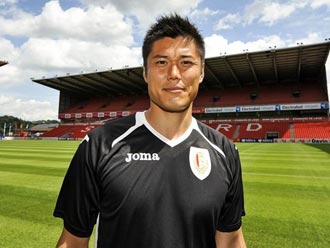Japanese Soccer Players Face Racism on European Teams
Racial Taunts: Japan's soccer stars find that their race adds an unpleasant edge to playing in Europe.
Japanese soccer players have revealed that they faced frequent taunts directed at them because of their race and nationality while receiving little support from their teams in the face of such abuse.
The issue became publicized recently after striker Yuki Nakamura said he had quit the Slovakian club Rimavska Sobota because he didn’t want to suffer any more racist abuse, according to Mainichi Shimbun.
Nakamura’s media accounts of the kinds of racism he faced prompted revelations of unpleasant incidents suffered by Eiji Kawashima, star goalie of the top Belgian club Standard Liege.
Nakamura’s experiences first surfaced in his blog accounts of unpleasant racial incidents during his years in Europe which also included playing for clubs in Romania and the Czech Republic. His own team’s fans “furiously” hurled abuse at him before and after games, he complained. Some of his teammates pretended not to notice and made no effort to help, he added. Finally, after it became clear that Rimavska wouldn’t take responsibility for the actions of their fans, Nakamura decided to quit and return to Japan.
“It is a pity that something happened like that, but, and this is just my opinion, Japanese players, not just players, Japanese people, have to be really tough in a foreign country,” Kawashima told Kyodo News in fluent English during an interview following Wednesday’s 3-0 World Cup qualifying win over Latvia. “It is not easy.”
“Living in Japan is really comfortable and really easy but you know when you go abroad the situation isn’t always the same,” said the goalkeeper who is described by the interviewer as “affable” and “multilingual”.
Kawashima, 29, recounted that in 2011, while playing for the Belgian team Lierse, opposing fans chanted “Fukushima, Fukushima” in reference to the nuclear disaster brought on by the March 11 earthquake and tsunami. Deeply upset and in tears, Kawashima complained to the referee who stopped the game while the chanting was stopped. The incident affected Kawashima deeply because he had personally supported relief efforts for the disaster victims.
Last October a French TV channel — in praising his impressive blocks in a 1-0 away win in France — showed a photo of Kawashima composited to have four arms accompanied by the explanation that it was due to the radioactive fallout from Fukushima.
“Sometimes people are against us just because we are Asian,” said Kawashima. “Some stupid people think that way and just joke in that way and we just need to be tough.
“I now understand that people joke in a stupid way,” he added. “Maybe the situation for [Nakamura] was really tough and he was really alone. But we have got to be tough, and if there is something wrong you have to stand against it.”
“But I was happy that I read an article that said he [Nakamura] was going to try again to go to Europe.”
Other Japanese players had complained of similar racial issues in Europe, including a former player who, in an interview just before the 2010 World Cup, said the toughest part of playing abroad was dealing with racism. His coach at his Italian club forced him to wear a yellow bib during training in an apparent dig at his race. He also expressed shock at the way black players were treated in Italy. Some were even turned away from nightclubs.
But the number of Japanese players working in Europe continue to increase. At Liege alone, two more Japanese players are joining Kawashima. The presence of another Japanese player provided “peace of mind” and induced him to join the team, according to one, a star striker named Kensuke Nagai.
“If someone is against Yuji or Nagai then I can be there [for them],” Kawashima said. “I just told [Nagai] Standard Liege is a well known club in Europe and if he can play well and have a good season he can transfer to another bigger team.”
“I would not say Belgium is [an] easy [place to live] but I think it is easy to adapt to European football,” Kawashima concluded.

Japan's Eiji Kawashima is the star goalkeeper for the top Belgian Standard Liege.

